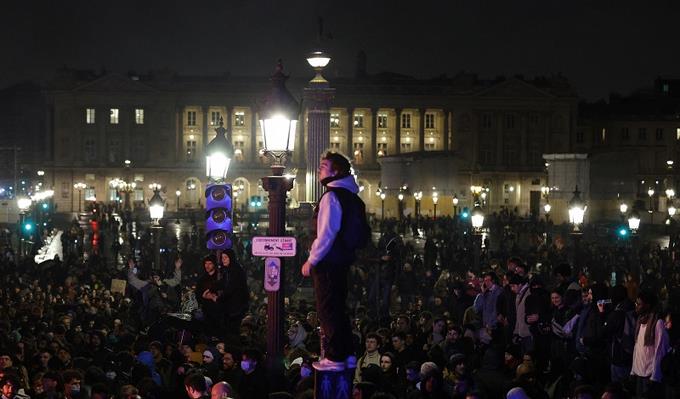The battle against the unpopular pension reform intensified this Friday in France after its controversial adoption by decree, with an increase in protest actions and the presentation of two motions of censure against the government.
With the Paris ring road cut for half an hour, high schools blocked, 10,000 tons of garbage accumulated in the capital or the invasion of railways in Bordeaux (south-west) and Toulon (south-east), the discontent of the French took many forms.
"We are sorry for this ad [del gobierno] like an insult. They haven’t heard from us for weeks. This generated a lot of anger"Philippe Melaine, a high school teacher in Rennes (west), told AFP, where more than 2,000 people demonstrated on Friday.
The day before, the liberal president Emmanuel Macron decided to adopt his reform, without submitting it to the vote of the deputies, fearing a defeat in Parliament, by virtue of a legal mechanism: the controversial article 49.3 of the Constitution.
Its objective is to delay the retirement age from 62 to 64 years by 2030 and advance to 2027 the requirement to contribute 43 years (and not 42 as now) to collect a full pension. Two out of three French people, according to polls, are opposed.
To prevent this, the opposition presented two motions of censure: one from the independent group LIOT and another from the extreme right. If at least one is approved –something complicated–, the government of Prime Minister Élisabeth Borne and the reform would fall.
"social explosion"
The government is under pressure. For observers, the use of article 49.3 was a "failure" and symbolizes the "weakness" of Macron, who is gambling with this reform his ability to act during his second term.
"The president could save the furniture by announcing that the law will be repealed following this undemocratic adoption. But it’s not like him to listen to the French"reads the editorial of the left-wing newspaper Libération.
For the moment, the decision prompted a response in the streets, which had lost strength in recent days after the largest protest against a social reform in three decades with between 1.28 and 3.5 million protesters on March 7. at the call of the unions.
But the latter have "fear" that the social movement surpasses them and becomes radicalized, CFTC president Cyril Chabnier told AFP, recalling that they have already warned the government that if it did not listen and use 49.3, it would have "risks of a social explosion".
Thousands of people gathered again on Friday afternoon at the Place de la Concorde in Paris, where the incidents that occurred the day before were repeated.
On Friday night, some groups threw bottles and fireworks at the security forces, who responded with tear gas to evacuate the place where a large bonfire was burning.
Police announced 61 arrests, adding to the previous day’s 310 arrests in various cities.
Pending the new day of massive protests called by the unions next Thursday, the leftist leader Jean-Luc Mélenchon called "spontaneous mobilizations". The Minister of the Interior, Gérald Darmanin, warned that he will not allow them nor the "disorder" neither.
The energy sector, the spearhead of the extendable strikes for ten days, intensified its pulse. The strikers threatened to shut down two refineries by Monday.
The authorities recommended canceling 30% of the flights at the Parisian Orly airport on Monday, 10% more than this week.
Motions of no confidence
After 49.3, the prime minister appears very weakened, defending the dialogue with the opposition for months to try to approve a reform that sought to balance the pension fund. "Our vocation is to continue governing"said the spokesman for the Executive, Olivier Véran.
On Monday afternoon, according to parliamentary sources, the government will face two motions of censure. The one presented by LIOT can obtain the maximum support, but it would fall short of 30 votes out of the 287 necessary to bring down the government and the reform.
The left-wing Nupes front, Marine Le Pen’s far-right group and LIOT deputies will vote in favour, but not the right-wing opposition party Los Republicanos, which negotiated the reform with the ruling party despite the rejection of some twenty dissident deputies.
In this pulse, Macron, re-elected in April until 2027 and who is not affected by the motion, even threatened to dissolve the Assembly, if it finally knocked down his reform. According to the polls, the extreme right would be the beneficiary of an electoral advance.
